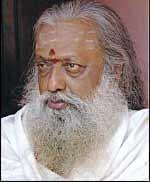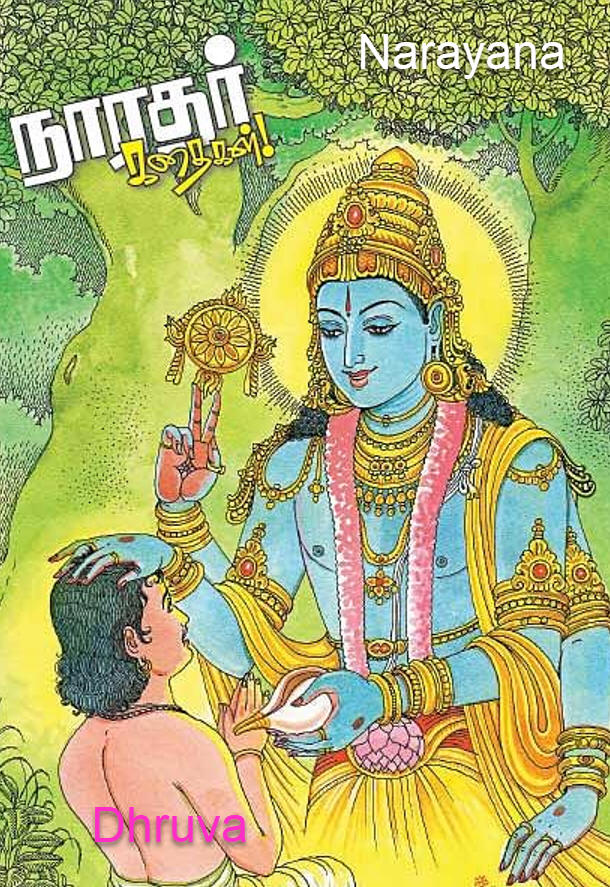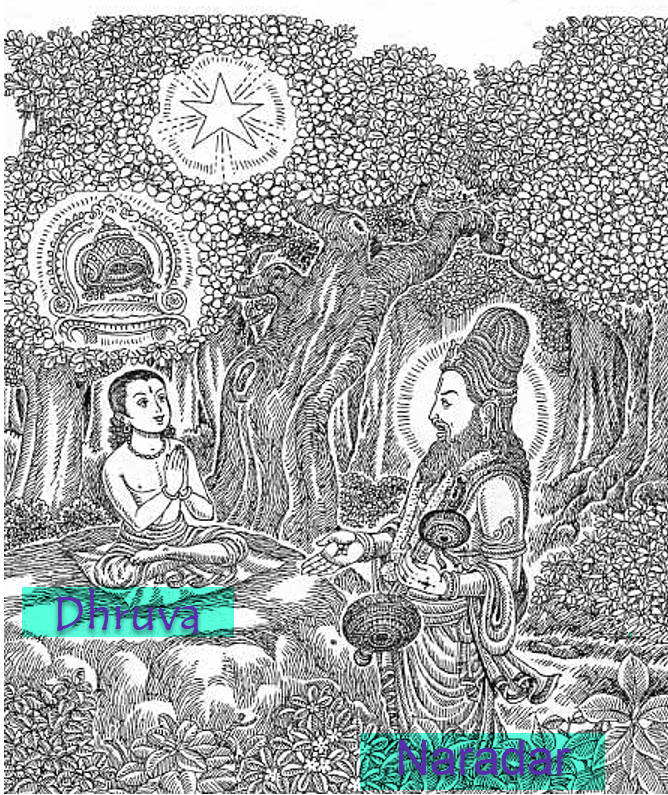Published:06 Jan 2014 7 PMUpdated:06 Jan 2014 7 PM Sakthi Vikatan
நாரதர் கதைகள்! - 20
Vikatan Correspondent
இது நான்கு வேத சாரம்எழுத்துச்
 சித்தர்
பாலகுமாரன், ஓவியம்: பத்மவாசன்
சித்தர்
பாலகுமாரன், ஓவியம்: பத்மவாசன்Author: Wordsmith Balakumaran, Paintings: Padmavasan
Later, Dhruva became Dhruva the Polestar in the heavens. In Hindu marriages, it symbolizes constancy expected of brides. - Harpers Dicionary of Hinduism page 78.
2. After an extended period, his first wife Kritthatthuthi gave birth to a girl, which increased her standing among people. The king neglected his other wives and spent all his time with the child and the first wife. The other wives, irritated by negligence by the king, poisoned and killed the girl. Heart-broken by the death of the girl, the king and the queen were inconsolable and crying.
3. The king and his wife were sad, wondering who could comfort them during their mourning and why this tragedy occurred to them.
4. Naradar and Angirasa Maharishi came to the royal couple and spoke endearingly to them.

5. Naradar: Death is natural for a newborn, a toddler, a youth, and the old and can occur for no reason. Death is the hallmark of the transience and the impermanence of life on earth: That is the enduring lesson for the world. This death should help you develop clarity of thought and vision, know what is transient and what is permanent, pursue the eternal God and receive his blessings and grace. We all know that only Tirumal is eternal.
6. But peace and reconciliation eluded the royal couple and cried loud often thinking of their dead girl. Unable to stomach the royal couple's constant loud cries, Naradar had a stratagem. What they desired most, what caused the constant crying, and whose departure was unbearable, was that baby, whom Naradar created in a flash, and asked the anabiotic child to speak to the royal couple.
7. The Newborn Infant: Why did you bring me back to life? My Karma dictates I must take a multitude of births. I thought I was peaceful and comfortable as the previous birth ended sooner than later. Why should I come back to this earth again? I have had plenty of parents, including the last one. Why should I remain with or come back to this last royal couple?
I am yet to take many births. What is the reason for my roiling in this birth? The current parents are not important from my perspective. After my death, my thoughts gravitate to the next birth, and I care not even one iota in the last birth and the parents. Please let loose your hold on me. I am ready to leave.
The infant said that and died soon after it.
8. The royal couple gained clarity of thought and wisdom. Their own flesh and blood did not love them. The couple's sorrow evaporated with the knowledge that this life's purpose was over and done with and in the received wisdom of getting ready for their rebirth. The royal couple thanked Naradar, understood the impermanence of the worldly life, and continued to live the rest of their lives.
9. A barefoot child, wearing a loincloth, was walking in the middle of the forest. His body habitus told he was a prince, but his face looked weary. His gait was robust. Naradar felt he was with determination rushing to the thicket in the jungle. As he neared, Naradar showed him his form. (Naradar has the power to appear and disappear depending upon the circumstances and purpose.) The boy looked up.
10. What the child saw was a grown man with merciful eyes, a smiling face, a tuft on the head, sectarian Vaishnava mark on the forehead, a saffron clothing, and a stringed musical instrument in his hands, on which he made music. The boy greeted him with opposed palms, fell at his feet, and got up. Naradar sang songs of praise to Tirumal. The princely boy played the cymbals, laughing and the worry on his face disappeared. The boy complimented Naradar for his excellent play.
11. Naradar: Who are you, child? Why are you walking in this dense and dreary forest? Your face shows worry. What is the reason? Tell me about you. But Naradar knew about him already and understood he was not a commoner.
12. That child spoke. My name is Dhruvan. My father is Uttanapadan with two wives, the king of this area. My mother's name is Sunithi, and my other mother's name Suruci. My mother is a quiet person and always thinks of Isvara. She is loving and compliant to the king and always circumspective.
13. My stepmother is flamboyant and possessive of my father. I heard my mother was unhappy with Suruci, and said, "Why is Suruci holding my husband for herself and not letting my husband go to my royal quarters?" Though unhappy, my mother was never harsh to Suruci. She used to say calmly, "She is holding my husband close to her. One day she will get wise."
14. My younger stepmother told me about my mother," she has no capabilities." The king agreed with her. I heard it and felt sad. My stepmother has Uttaman as her son: a handsome, active, and good brother. When Suruci and my father were sitting on the golden swing with Uttaman on his lap laughing at me, I desired to sit on my father's lap and went near him, but he stopped the swing.
15. My stepmother hastened the swing and never allowed me to go near it. I told my stepmother I wanted to sit on my father's lap.
16. My stepmother Suruci told me, "You don't have that privilege. Since Uttaman was born of my womb, he sits on your father's lap. Since you were born of another woman, you don't have that privilege. To sit on your father's lap, you must be born of my womb. Go! Do Tapas (penance)."
17. Dhruvan: Suruci's words hurt me deeply. I tried to go to my father, but my stepmother stopped me. He pushed me out of the room and said, "Go and do Tapas to take birth in my womb." I tripped, fell, and got up, as my father stood there laughing at me. I could see the unhappiness on his face. To hide his distress, he laughed louder.
18. I was miserable and went home crying. When I saw my mother, my cry burst forth louder. My mother is so good. My father seems not to know it. My mother ran and embraced me, asking what I wanted. I narrated what happened. My mother was unhappy.
19. Suruci, my mother: "What your stepmother said was correct. Because you were born of me, you did not get what is due you: the palace, comforts, privileges, and access. As your stepmother said, do penance and worship Tirumal. "I asked her how Tirumal looked." My mother described him beautifully. I asked her, "Where should I go?" She said, "Go to the forest and do it." I asked her, "Why?"
20. Suruci told Dhruvan, "The palace life is full of noise and goings-on and will interfere with your concentration. In the forest, you will hear animals and the rustle of the trees. But it won't distract you too much. Find a safe spot away from the animals, sit in meditation, and look into your heart and soul to know who you are inside. As you look inside, you will see it fills with God's grace and receive the vision of God." Dhruvan was on his way to find a place for penance.
21. Naradar was unhappy to see a child suffer. He felt sad about why a small child should go through so much pain. Naradar addressed Dhruva, "Your mother advised you well. Forest is the right place for Tapas. I will choose a good spot for you in this forest." Naradar chose a good spot and cleared the area. Dhruva sat there.
22. Naradar: "As your mother said, find it in your heart the sound of 'I' and where you feel the sense of 'I', therein you fix the God. As your Tapas becomes intense, God will arrive. Tirumal is very kind, seeing a child in severe penance, he will give you Darsan soon."

24. Witnessing Dhruva's penance, Devas world wondered and even feared. As days went by, the intensity of his Tapas deepened. Afraid of deepening Tapas and any adversity to the Devas world, the Devas went to Tirumal and begged him to give Dhruva Darsan.
25. Tirumal appeared before Dhruva, stroke his head gently, and said, "Get up, my child! What do you want?" Dhruva opened his eyes, sang panegyrics like Naradar, and fell prostrate at Tirumal's feet.
26. Dhruva: "My stepmother stopped me from sitting on my father's lap. But you came today. Whatever you want to give me, give it. I have no desire to ask you for anything specific." Dhruva stood before Mal with opposed palms.
27. His humility and clarity of vision pleased Tirumal, who said, "Your father will die soon. You will become the sage king for several hundred years. After that, you will stay in a corner in my world permanently. You will be the exemplary and celebrated light in telling the world about the greatness of Tapas. You will receive the name Dhruva Star. People will know your history by seeing you, receive inspiration to perform Tapas, and realize that a child, denied his father's lap, is sitting on God's lap. You sit in your place and bless the world there should be a hundred more of you in this world.
28. Dhruva magnificently ruled his kingdom, morphed into a star, and watched the world permanently from the sky.
29. Because of Naradar's guidance and love, a prince became a permanent visible starry feature in this world. Association with good people will uplift even ordinary men to lofty heights, and Dhruva's story is an example.